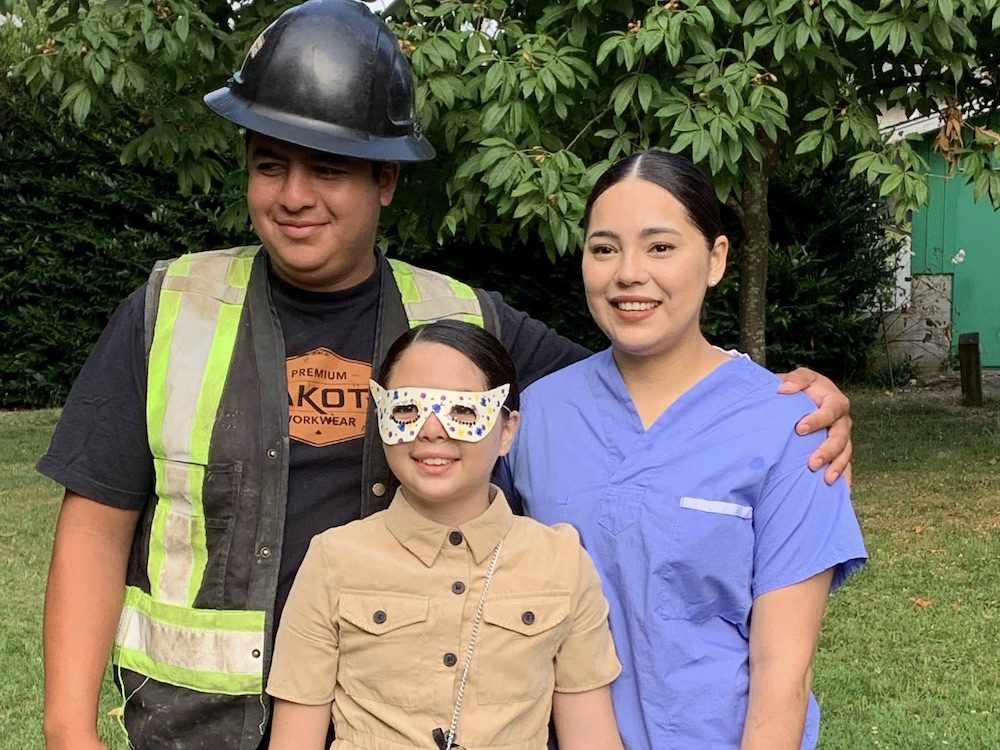B.C. Health Minister Adrian Dix is calling on Ottawa to stop the impending deportation of a New Westminster health-care worker and her family to Mexico.
Hospital housekeeper Claudia Zamorano, her husband, nine-year-old daughter, and her husband’s mother and brother fled from threats of violence in their home city of Colima in 2017, but their refugee claim has been denied.
Zamorano works full time at Royal Columbian Hospital and her husband, Andres, is a carpenter.
They are scheduled for deportation on Dec. 19, despite the fact their application for permanent residency on humanitarian and compassionate grounds has not yet been processed by Immigration Canada.
“From the beginning of this pandemic, people in Canada and British Columbia have relied on health-care workers like Claudia Zamorano,” a spokesperson for Dix’s office wrote to The Tyee in an email.
“After years of helping keep B.C. families safe during their time of need, we owe it to the Zamorano family to keep them safe and strongly urge the federal government to suspend their deportation.”
The provincial call comes days after the Hospital Employees’ Union, which represents Zamorano, and local migrant rights groups urged federal Health Minister Jean-Yves Duclos to intervene and ask Immigration Minister Sean Fraser to approve the family’s application.
Earlier this week, Duclos was in Vancouver meeting with provincial and territorial ministers of health to address the health-care crisis across Canada. When asked about Zamorano’s case by The Tyee Tuesday, he said he did not have the specific details and would defer to Dix for comment.
Migrant rights advocacy group Sanctuary Health says it makes no sense to deport an essential worker and her family in the midst of the very health-care staffing crisis Duclos was in town to discuss.
“The federal government prides itself as being compassionate and welcoming of immigrants,” said Omar Chu, a member of Sanctuary Health, in a news release.
“And yet, this December, six days before Christmas, we’ll be deporting a health-care worker, her daughter — who has only ever known the Canadian school system — and their family back to Mexico, where their safety is at risk. It doesn’t make any sense.”
The federal government has said it will increase immigration to alleviate labour shortages that are driving the crisis in health care and other essential sectors.
Zamorano started as a hospital housekeeper in the peak of the pandemic’s second wave in November 2020. “It was scary for me and my family,” she said. “But I had to do it.”
A special refugee category — now closed — did exist for health-care workers. But in any case, workers like Zamorano, who don’t directly work with patients, weren’t eligible.
Meena Brisard, secretary-business manager for the HEU, said the immigration minister could approve Zamorano’s residency application “to keep another needed health-care worker on the job.”
“We should be doing everything we can to keep health-care workers like Claudia.”
The HEU and Sanctuary Health are also calling on Fraser to reopen the health-care worker refugee track and widen it to include essential health-care workers like Zamorano.
“Claudia has been on the frontlines of infection control, cleaning and sanitizing hospital rooms to keep other health-care workers, patients and members of the community safe from COVID,” said Brisard. “She has put herself and her family at risk of contracting COVID for three years to help keep Canadians safe.”
The HEU and Sanctuary Health have helped co-ordinate more than 1,200 letters to Fraser’s office since Zamorano’s deportation date was set in August.
Delays in processing refugee, permanent resident and work and study visas have plagued newcomers to Canada since the start of the pandemic.
Even if their application is approved, the toll of the years-long process on Zamorano has been immense. “It’s so stressful,” she told The Tyee.
Through the course of her family’s six different applications and appeals, she began suffering anxiety attacks that left her whole body shaking. She works full time and has been handling all the paperwork for all five family members.
Zamorano started anti-anxiety medication that has helped with the attacks, and she and her daughter both see counsellors to deal with the distress.
But last Monday, she suffered a dizzy spell at work while she had been speaking with a patient and mopping the floor in the room. Zamorano collapsed outside the room and a nurse checked her.
“I know it was the stress,” Zamorano told The Tyee. “I’m trying to block the thoughts in my mind, but it’s hard.”
Zamorano says her daughter understands what is happening, but it is hard to explain to her why they may have to leave the only home she has ever known.
Right now, their lawyer has applied for a stay of their deportation until the family’s permanent residence applications are at least processed.
“We hope that the community can help us,” said Zamorano. “We are going to try our best, we are going to work hard for this country. We are not bad people. We are trying our best to make this community better." ![]()
Read more: Health, Rights + Justice

















Tyee Commenting Guidelines
Comments that violate guidelines risk being deleted, and violations may result in a temporary or permanent user ban. Maintain the spirit of good conversation to stay in the discussion.
*Please note The Tyee is not a forum for spreading misinformation about COVID-19, denying its existence or minimizing its risk to public health.
Do:
Do not: